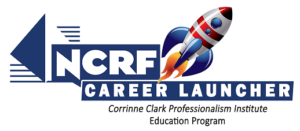Looking for a job in today’s competitive market can be difficult. So how do you make yourself stand out among the competition? How do you get a potential employer to take interest in you and want to interview you? According to the pros, the best way is to differentiate ourself. Focus your résumé around your strengths and goals. Let your unique skills and abilities shine, every step of the way — from your résumé to the follow-up after an interview.
Résumé
Positive first impressions can help you stand out among the competition. Your first opportunity to make a good impression is with your résumé. The person reviewing your résumé is generally the one who will decide whether you will get an interview or not. So consider your résumé your first interview, as well as the first opportunity to promote yourself. Pay attention to detail. A résumé should be easy to read, concise, neat, and well organized. Undoubtedly, a future court reporter should use proper grammar and correct spelling. When a résumé is free of errors, it allows the reader to focus on the content.
Michelle Grimes, a recent graduate of the College of Court Reporting, located in Hobart, Ind., feels that proofreading your résumé is of utmost importance because it demonstrates use of correct spelling, grammar skills, attention to detail, thoroughness, and a strong integrity to make your work “sparkle.”
In addition, résumés should be tailored to each specific job or position you are applying for — they are not one size fits all. Read the job description carefully and figure out what qualifications the employer is looking for and what you can offer them. Then tailor your résumé around the skills and experience you have specific to that position.
Be sure to showcase your skills and abilities. List any credentials you have, as well as membership in any court reporting or other professional associations and any relevant experience. It is also important to include the court reporting program you graduated from and your academic achievements. In addition, make note of any efforts you are taking to further your skills, and include activities that reflect good social skills such as groups for which you volunteer or social groups with which you are involved. Along with listing your skills and experience, consider including how those skills can benefit your potential employer.
If you are a young professional just getting started in your career, outside activities can provide you with the experience to show skills you may not have had the opportunity to use in your professional life, such as leadership, organization, and time management.
Finally, always volunteer a difficult transcript for your potential employers to review. “When a reporter volunteers a transcript, I am always impressed, provided it turns out to be excellent, of course,” said Tiffany Alley, RPR, founder of Tiffany Alley Global Reporting & Video in Atlanta, Ga.
Interview
It is better to be 10 minutes early than 10 minutes late. Being prompt for your interview shows you want to be there and you respect the interviewer’s time. When introductions are made at an interview, be sure to make eye contact, give a firm handshake, and address the interviewer by name.
“It goes without saying that there’s never a second chance at first impressions, so appearance and friendliness must always be tops,” said Robert Gramann, RPR, President of Gramann Reporting & Videoconferencing, in Milwaukee, Minn.
During the interview, convey that you are willing to go the extra mile to keep attorneys loyal to the company you represent. Demonstrate flexibility and a cooperative attitude. Be yourself. Try to relax and enjoy learning about the job opportunity, expectations, and the people employed there.
Focus on what the interviewer asks and then be concise but thorough when answering. If it helps to illustrate your skills, provide an example of the work you have done. Be honest. If you don’t have a particular skill, just state that and follow up with your intentions of future plans to gain the necessary skill set. Research the firm before your interview. During the interview, ask great questions to show that you are familiar with the company and the specific position for which you are applying.
Bring a copy of your résumé to an interview along with two or three business references and their contact information, and be prepared to leave this information with the interviewer. Also, be sure to make contact with your references in advance to tell them you are interviewing and with which firms so they are prepared and not caught off guard.
Finally, ask the interviewer for their business card. Their business card will help you remember their name, provide the correct spelling of their name, and list their street and email addresses. This is all crucial information you will need when you send a thank-you note.
Interview follow-up
Follow up any interview with an email or hand-written thank-you note to each person with whom you interviewed. Since many people don’t follow an interview with a thank-you note, doing so makes you stand out from the crowd and can help reinforce that you’re a strong candidate. A thank-you note shows good business etiquette and reinforces your interest in the position.
A thank-you note can also be used to address any issues or concerns that came up during the interview. Briefly thank the interviewer for their time, restate why you want the job, and write something about how you intend to make a contribution to the firm. If you interviewed with several people, add something specific about that interviewer, making each note unique. Keep it short and simple — a couple of paragraphs is adequate — and make sure to proofread the note before sending it out. Try to send your thank-you note that evening so the interviewer will receive it the next day. If that is not possible, make sure to send it within 24 hours of the interview.
Even if you feel a particular job is not for you, follow up with a thank-you note. Potential employers will remember you and may call you back for another position or recommend you to another firm.
Networking
Personal contacts are invaluable when it comes to getting noticed. It is often said it is not what you know, but who you know. It is never too early to begin networking. Networking is all about building relationships. It goes without saying the more time you have to network, the larger your network is going to be and the greater the potential for launching your career. Networking is an investment in your career and your future. Start networking while you are still in school. One of the best places to network is at your state association events and NCRA conventions. What better place to meet prospective employers? “I’ve found lots of work because of contacts I have made there,” said Joshua Foley, a recent graduate of College of Court Reporting, in Hobart, Ind.
Social Media
Social media sites such as LinkedIn are also a great place to network. Join and actively participate in court reporting forums and other career-related sites. Social media can be used as a tool to promote yourself by connecting to sites like a company’s LinkedIn page. “Social media is like many other forms of advertising. If your name keeps popping up in different but related reporting venues, your chances of obtaining a reporting position increase,” said Gramann.
Make sure to recognize, however, that social media has the potential to make or break your career. Social media should focus on activities and endeavors that show good judgment. Many employers check social media sites such as Facebook, Twitter, and LinkedIn to learn more about potential candidates, so consider social media sites as part of your résumé.
Advice from seasoned professionals
Use your spare time to increase your writing speed. “Extra speed is like money in the bank. Become an expert at using your CAT software by signing up for training, attending webinars, viewing tutorials, and reading the manual,” said Gramann.
In addition, be willing to contact all the major firms in your area and ask to be put on their overflow list. “Take whatever job is offered to you and exceed production expectations,” advises Valerie Seaton, RPR, CCR, president of Moburg, Seaton & Watkins, in Seattle, Wash.
Alley has this final piece of advice for getting yourself recognized and remembered,“ You need a twist — something that makes you unique and attractive to your ideal employer. Training new reporters is a lot of work; give the employer a good reason why they should be willing to invest in you. If you want the job, ask for it.”










